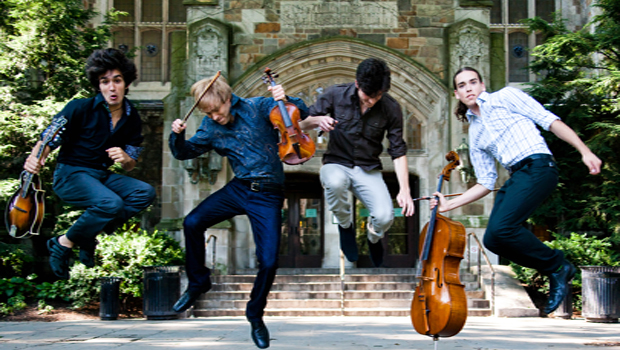FiddleDeis: Duels, jams, swagger and twang
Three-day festival comprises performances, master classes and workshops

Beginning with Aaron Copland, Leonard Bernstein and Irving Fine, Slosberg Music Center has hosted performances and lectures by brilliant musicians, composers and conductors. This spring, it will be the locus of a different kind of virtuosity, one of duels, jams, swagger and twang. It’s the voice of Dublin, Oslo, and Bangalore, filtered through the Brandeis music department’s own wide range of knowledge and connections: FiddleDeis.
The fiddle, like no other instrument, gives voice to unlimited human expression—lament, exultation, yearning and delight, to name but a few. The fiddle inspires celebration and mourning, lively jigs and elegant waltzes. From Canada’s Cape Breton to the Louisiana bayou, from high lonesome bluegrass to the lowdown blues, it’s hard to imagine a musical landscape that does not include a fiddle or violin.
No matter their cultural origin, fiddlers treasure originality and invention. A devoted fiddle player can play for hours, solo or with others, by memory or by improvising. The great ones can riff like a jazz master, staying true to the essence of the melody.
“Fiddling is a dynamic and vastly expressive art form with all the trappings of other art forms,” writes musician Ryan Thomson in “The Fiddler’s Almanac,” a practical reference work. “There are old standards, new trends, conservatism, economic and social considerations.” With room for innovators as well as purists, it’s a genre that will never stop growing.
So then: FiddleDeis. Possibly the strongest common ground of the very diverse Brandeis music department, this three-day festival celebrates the progression of the violin in performance. Distinguished faculty members and guest musicians will escort audience members through an unprecedented whirlwind of performances, master classes and workshops. There is even a yoga and relaxation session with stretches designed for string players.
Further blurring the violin/fiddle, classical/traditional distinction, many of these performers were conservatory trained before finding their fullest expression with the addition of traditional folk forms or electronic expertise. They perform in settings as diverse as concert halls and whitewater raft trips; they tour internationally and give high-tech TED Talks to a global audience. Many have attracted a strong and faithful following at enormous music festivals, and look forward to giving an intimate performance in Slosberg’s recital hall. Others are local heroes, such as father and son Andy and Dave Reiner, directors of the annual "Fiddle Hell" musical marathon in Concord, Mass., which attracts hundreds of players from around the world.
There’s an exuberant generosity in the fiddle world that spills over into jams, seisiúns, and dances. FiddleDeis offers a welcome jam, a guided jam, an open jam, a groove-finding jam and a dance. Many of the performers will teach master classes throughout the festival. Shawna Kelley, the department’s concert manager and a veteran employee of gatherings such as the Newport Folk Festival, has convinced her friends on the roster to teach what she calls repertoire run-throughs: 50-minute sessions in which participants learn a song well enough to play it in one big community session on Sunday morning.
Here’s a day-by-day road map. For a complete schedule, ticket prices and updates, please visit the event page.
Friday, March 15: From the Fjords to the Moors
The festival kicks off with a welcome jam and master classes throughout the day. The evening concert features Mariel Vandersteel, on the ethereal Norwegian Hardanger fiddle; Andy and Dave Reiner (bluegrass, Irish, Western swing, and more); the Laura Cortese Acoustic Project, led by “the sassy local folk-pop goddess of fiddle,” grounded in bluegrass and Celtic fiddle traditions. Jeremy Kittel (ex-Turtle Island Quartet), one of the world’s leading Scots-Irish fiddlers, and his band finish up the evening.
Saturday, March 16: Around the World on Four Strings
Day two continues with daytime jams, master classes and workshops. The evening concert follows a wild route through a range of expressive forms: South Indian classical from Meena Kothandaraman (Bentley University); jazz improv from Ben Powell and his trio -- Evan Caleb-Yearsley (drums) and Troy Sandow (bass); French- and blues-influenced Cajun roots music from David Greely (founding member of the Mamou Playboys); and the genre-defying Casey Driessen, known for his use of digital looping to create powerful, jaw-dropping, high-energy fiddle sounds. “Casey has performed with Béla Fleck, Abigail Washburn and Steve Earle and was the obvious choice to represent electronic and new music,” says Kelley.
Sunday, March 17: Roots Revealed
Remember those repertoire run-throughs? Sunday morning is the chance for everyone who’s learned tunes over the past two days to perform en masse. The concert repertoire travels back in time to medieval and 17th century England, revealing the roots of all that was performed on Friday and Saturday. Performers include Sarah Mead, Emily Walhout, Shira Kammen and Cathy Liddell on treble & bass violin, viola da gamba, lyra-viol and theorbo. Those Elizabethans were spirited partiers, so their music is a natural bridge to an Irish jam session in the Reinharz Residence Hall (next door to Slosberg Music Center) with the Reiner Family Band. Finally, Lydian String Quartet violinist Dan Stepner connects the music of Bach to country, Cajun and Cape Breton styles. Stepner will demonstrate the common techniques – the fast alternation of strings, for example – that link baroque and traditional playing. Stepner promises to bring the festival to a rousing close. “Why not?” he says. “Let’s go for baroque.”
Categories: Arts





